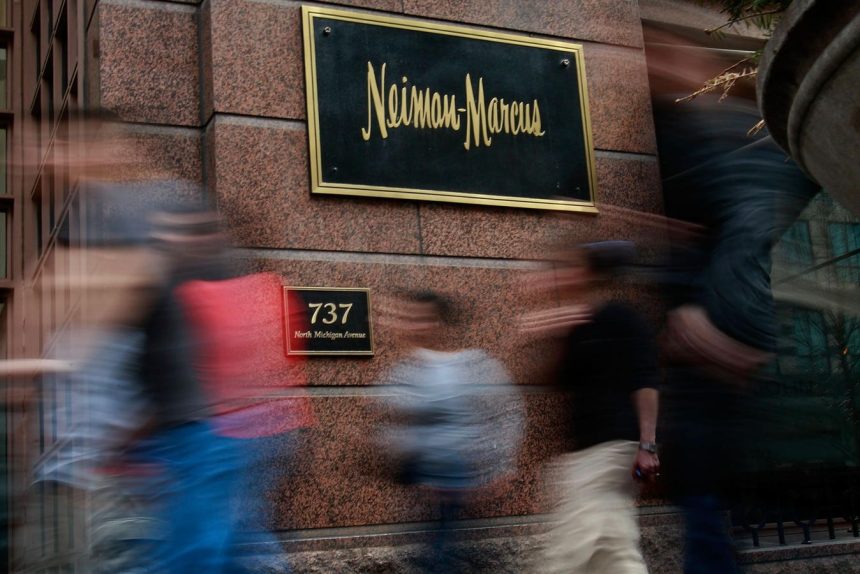The Luxury Landscape Reshaped: Saks Global Acquires Neiman Marcus in a $2.7 Billion Deal
The luxury retail sector witnessed a significant shift in power dynamics on Monday as Saks Global finalized its acquisition of Neiman Marcus Group (NMG) for $2.7 billion. This strategic move brings together two iconic names in luxury retail, creating a formidable portfolio encompassing Neiman Marcus, Bergdorf Goodman, Saks Fifth Avenue, and the off-price retailer Saks OFF 5TH. The acquisition, financially backed by a consortium including e-commerce giant Amazon, Salesforce, and Authentic Brands Group, marks a pivotal moment in the evolution of luxury retail, promising potential synergies, cost reductions, and innovative customer experiences.
Strategic Rationale and Financial Backing:
The acquisition is driven by several strategic objectives, primarily aimed at enhancing profitability and navigating the challenges of a changing luxury market. By consolidating operations and leveraging increased bargaining power with vendors, Saks Global anticipates significant cost reductions in supply chain management and procurement. The infusion of capital from strategic partners like Amazon, Salesforce, and Authentic Brands Group provides the financial muscle to execute this transformative integration. Amazon’s involvement adds another layer of intrigue, signaling its growing ambition in the luxury retail space and its potential to reshape the customer experience through technological innovations.
A New Era for Luxury Retail:
The deal unites Neiman Marcus’s 36 upscale stores across key markets like California, Texas, Florida, Illinois, and New York with the existing Saks Fifth Avenue footprint. This expanded physical presence creates a powerful network for reaching affluent consumers, while the inclusion of Bergdorf Goodman further solidifies the group’s position in the ultra-luxury segment. The Saks OFF 5TH brand provides a strategic entry point for price-conscious consumers, expanding the accessibility of designer brands and diversifying the overall portfolio. This multi-tiered approach caters to a broader spectrum of luxury shoppers, potentially mitigating the impact of fluctuating economic conditions and evolving consumer preferences.
Navigating a Shifting Landscape:
The acquisition comes at a crucial juncture for the luxury retail industry, which faces headwinds from fluctuating economic conditions and shifting consumer demographics. Recent reports indicate a contraction in the luxury market, with millions of consumers exiting due to rising costs of living and escalating luxury goods prices. This challenging environment necessitates strategic adaptation and innovation. Saks Global’s move to consolidate resources and expand its market reach through the Neiman Marcus acquisition can be interpreted as a proactive response to these market pressures.
Amazon’s Role and Future Implications:
Amazon’s involvement in the deal extends beyond mere financial backing. The e-commerce behemoth is expected to collaborate with Saks on innovative customer experiences and brand partnerships, leveraging its technological expertise to enhance the online and offline luxury shopping journey. This partnership could include personalized recommendations, enhanced online shopping interfaces, and potentially even integration with Amazon’s vast logistics network. The access to a wider array of luxury goods, including pre-owned items from coveted brands like Louis Vuitton, Prada, Gucci, and Chanel, further strengthens Amazon’s presence in the luxury sphere.
Resurrection and Transformation:
The acquisition of Neiman Marcus by Saks Global represents a remarkable turnaround for the former, which emerged from bankruptcy just four years ago, burdened by the impact of the COVID-19 pandemic and store closures. This deal signals a renewed chapter for the iconic brand, offering a path to stability and growth within a larger, more diversified luxury retail ecosystem. The combined resources and expertise of Saks Global and Neiman Marcus, coupled with the strategic backing of Amazon and other partners, position the group to navigate the evolving luxury landscape and capture new opportunities in a market undergoing significant transformation. The success of this integration will depend on the effective execution of synergy realization, innovative customer experience enhancements, and the ability to adapt to the ever-changing dynamics of the luxury consumer.



